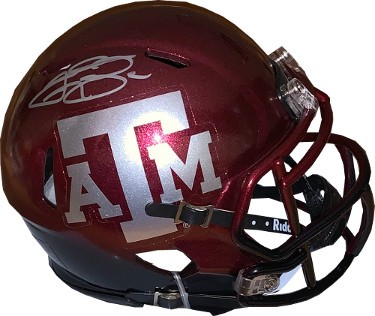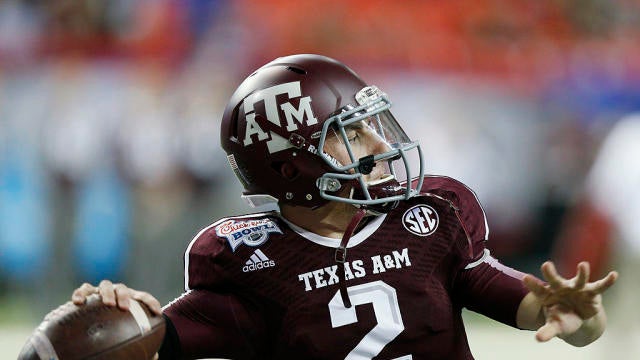

Manziel said another individual approached him during that autograph-signing session and told him he was getting "ripped off" before offering to connect him with another man who would pay him $30,000.

"And I may or may not have gone back to this guy's condo and signed probably 10,000 pieces. "We're doing it all sneaky, we don't want to get caught, we're trying to learn from everybody else who's got caught," Manziel said during the interview that was published Thursday by Barstool Sports. Manziel recounted selling his autograph during an interview on Barstool Sports' "Bussin' With The Boys" podcast, detailing two different transactions in 2013 that he says netted him $33,000.

Johnny Manziel says he "made somewhat of a decent living" by selling autographed items during his days at Texas A&M, but that he "never took a dollar" until after he won the Heisman Trophy in 2012. Johnny Manziel says he made 'decent living' selling autographs at Texas A&M, but 'never took a dollar' before winning Heisman Trophy
#Johnny manziel autograph upgrade
The NCAA has yet to make any statement following Manziel’s interview.You have reached a degraded version of because you're using an unsupported version of Internet Explorer.įor a complete experience, please upgrade or use a supported browser When asked what he would do if the NCAA took away his Heisman Trophy, Manziel clarified that he “never took a dollar” until after his historic win and guessed that the statute of limitations were up, so the NCAA could “bl–w” him again. Manziel, who is perhaps more famous for his sub-par performance in the NFL with the Cleveland Browns as well as his off-field controversies nowadays, joked that the NCAA could “f–king bl–w” him given that he had a 9-4 season and the Chick-fil-A Bowl appearance against Duke University in his sophomore season.
#Johnny manziel autograph code
Once he sent the man a picture of the items with his autograph, he would be given a code to a safe in the room with his money. “Johnny Football” explained that the man told him to go to a room at a hotel in Miami, where there would be merchandise laid out for Manziel to autograph. This anonymous person then offered to connect Manziel with another person who would pay him $30,000, which Manziel agreed to. Though the business dealings were top-secret, enough people knew about Manziel’s side hustle that someone told him he was getting “ripped off” by the man. “I may or may not have gone back to this guy’s condo and signed probably 10,000 pieces,” Manziel alleges during the interview.

(Though with lawmakers debating the issue on both a federal and state level, this rule may soon change.) Getting caught accepting money in this way can affect an athlete’s “amateur” status and eligibility to compete at the collegiate level. Here’s why that matters: NCAA bylaws, which apply to all college athletes, currently prohibit athletes from accepting money for promotion or sale of a product or service. “We don’t want to get caught, we’re trying to learn from everybody else who’s got caught,” Manziel explains during the interview. Now how does an undergraduate athlete make that much money selling their autograph? By being very, very sneaky.


 0 kommentar(er)
0 kommentar(er)
